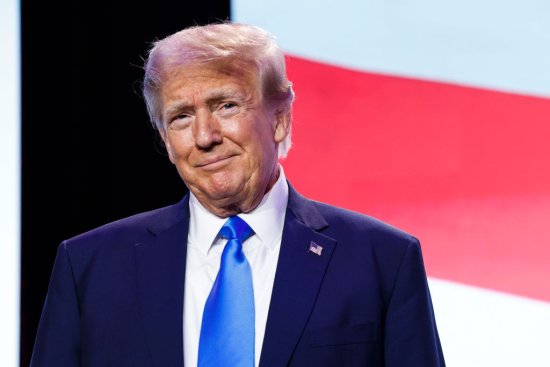
In appeals for campaign donations, Donald Trump is claiming a proposed gag order would block him from criticizing Joe Biden. It's not true.
Donald Trump will still be able to criticize President Biden, even if a judge agrees with prosecutors’ demands for a gag order in a case in which he is charged with trying to overturn the 2020 election.
But that’s not what Trump is telling his supporters in fundraising emails. As the former President tries to boost donations to his re-election bid, he has repeatedly claimed that a proposed gag order would block him from publicly criticizing Biden. The falsehoods are part of a broader effort by Trump and his allies to frame the multiple prosecutions he is facing as politically motivated.
[time-brightcove not-tgx=”true”]Some of Trump’s urgent pleas for financial support in recent days have opened with the phrase, “If Joe Biden gets his way, this would be the LAST email I send to you.” In breathless demands, peppered with liberal use of capital letters, Trump then falsely claims that Biden himself is pressuring the courts to “SILENCE and CENSOR” him. “The gag order is so broad and extreme that it would make it IMPOSSIBLE for me to speak negatively about Crooked Joe,” states one recent fundraising email from Trump Save America Joint Fundraising Committee. Another reads: “Crooked Joe is turning to the courts to try and impose a GAG ORDER against me and RESTRICT my right to speak out against his corrupt and tyrannical regime.”
The fundraising messages echo Trump’s legal arguments before the judge. Trump’s legal team wrote in a court filing that that Special Counsel Jack Smith’s request to restrict Trump’s statements and social media postings about the case are an “obvious attempt by the Biden administration to unlawfully silence its most prominent political opponent.”
Smith has not asked the judge to silence Trump’s political speech.
In a request to the court filed on Sept. 15, Smith asked US District Judge Tanya Chutkan to issue a “narrowly tailored” order preventing Trump from making public statements that “pose a substantial likelihood of material prejudice to this case.” If Judge Chutkan agrees, the order would restrict Trump speaking or posting on social media about “the identity, testimony, or credibility of prospective witnesses” and would prohibit him from issuing “disparaging and inflammatory or intimidating statements about any party, witness, attorney, court personnel, or potential jurors.”
Smith laid out pages of examples of statements Trump has made since he was indicted in the case in August, saying that such statements were “misleading and inflammatory” and “undermine confidence in the justice system and prejudice the jury pool.” Smith pointed to Trump’s message on his social media platform TruthSocial on Aug. 4, three days after being charged, saying “IF YOU GO AFTER ME, I’M COMING AFTER YOU” and said that Trump has already “made good on his threat.” Trump has called Chutkan a “biased, Trump-hating judge,” Special Counsel Smith “deranged” and former Vice President Mike Pence, a potential witness in the case, “delusional.”
None of those points convinced Trump to stop criticizing witnesses or the judge in public. A day after Smith’s initial court filing, the former President wrote on Truth Social that Pence had gone to the “Dark Side” and “made up stories.”
In another message to the judge dated Sept. 29, Smith pointed out that Trump was continuing to criticize witnesses in the case, three weeks since the initial request for a gag order. Trump’s “continuing public statements about witnesses are substantially likely to materially prejudice a fair trial,” Smith wrote.
Smith highlighted Trump suggesting that another witness in the case, Mark Milley, the retiring Chairman of the Joint Chiefs of Staff, deserves to be executed. Trump had criticized Milley, for reportedly made phone calls to his Chinese counterpart to ease fears that the U.S. was planning to attack based on Trump’s belligerent public comments, according to reporting by Bob Woodward and Robert Costa in the book Peril. “This is an act so egregious that, in times gone by, the punishment would have been DEATH!,” Trump wrote on Truth Social on Sept. 22.
A federal judge like Chutkan has broad leeway in issuing orders restricting the speech of defendants and can issue penalties up to and including requiring that a defendant be jailed while waiting for trial. Trump’s legal team will have a chance to make their case against the gag order in person on Oct. 16, when Chutkan scheduled a hearing at the federal courthouse in Washington, DC, on the topic.
Judge Chutkan is empowered to issue orders to protect a fair process, protect the jury pool and court personnel and prevent the cowing of witnesses, says Harry Litman, a former federal prosecutor.
If the judge moves forward with the order Smith requested, Trump “can say pretty much whatever he wants about Biden,” Litman says, as long as Trump is not characterizing the case as a Biden prosecution “and then proceeding to trash the prosecution and witnesses.”
Separately, a Colorado judge has issued a protective order prohibiting threats and intimidation in a lawsuit seeking to bar Trump from the state’s 2024 presidential ballot. The gag order applies to all parties involved in the case, including Trump.
Trump’s campaign did not return multiple requests for comment.
The case over Trump’s actions trying to overturn the 2020 election results is set to go to trial in March. It is one of four criminal trials Trump is facing. He’s also facing charges in Georgia’s Fulton County alleging he was part of a conspiracy to fraudulently overturn Biden’s win in the state, in federal court in Florida over his handling of classified documents after he left office, and a case brought by the Manhattan district attorney over how his business accounted for a hush money payment to adult film actress Stormy Daniels before the 2016 election.